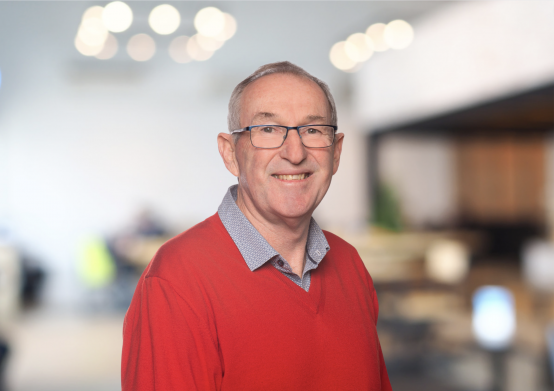
- Details
- Written by: Naomi Harrison
- Category: News
- Hits: 262
After almost three decades of outstanding service to Peter Mac and cancer research, Associate Director of Laboratory Research Professor Rick Pearson is retiring.
His ground-breaking contributions and innovative approaches have significantly advanced the understanding of cancer and paved the way for improved treatments and patient outcomes.
"I've had a fantastic time since I started here and have actually spent 43% of my life working at Peter Mac," Professor Pearson told a meeting of Peter Mac's research department today.
"I'm very proud of my lab and the success we've had; the momentum in research at Peter Mac is amazing and we continue to have a great, collegial group of researchers and that's why we're successful."
Professor Pearson’s journey into cancer research began with a deep-rooted passion to unravel the mysteries of cancer biology.
He received his PhD from the University of Melbourne in 1992 and spent three years as a Human Frontiers of Science Fellow at Friedrich Miescher-Institut in Switzerland before returning to Melbourne to establish the Cancer Signalling Laboratory at Peter Mac in 1995.
In addition to his role of Associate Director Laboratory Research, Professor Pearson was also Head of the Oncogenic Signalling and Growth Control Program at Peter Mac.
“A major focus of his research is to understand the molecular basis of the regulation of ribosome biogenesis, protein synthesis and cell growth,” Peter Mac’s Executive Director of Cancer Research Ricky Johnstone explains.
“His program played a pivotal role in showing that fundamental alterations in the activity of the pathways controlling ribosome synthesis and function were essential for cancer formation and progression.”
Professor Pearson’s lab reasoned that direct targeting of the ribosome would provide a new treatment paradigm for cancer and they developed the first selective inhibitor of ribosome biogenesis, CX-5461 that targets RNA Polymerase I (Pol I).
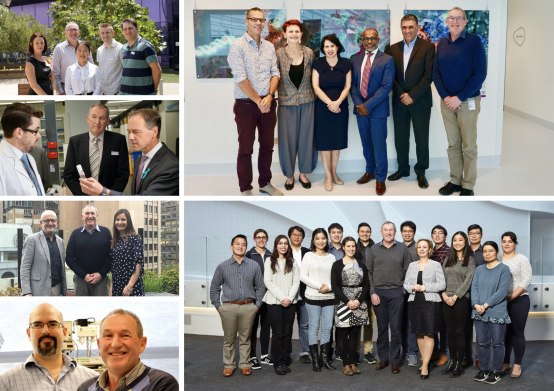
He has led a team of fundamental and clinical researchers in optimising the utility of ribosome targeted therapies in the treatment of both blood and solid cancers.
His work has been published in highly ranked journals with 140 peer reviewed articles in publications including Cancer Cell, Cancer Discovery, Journal of Clinical Investigation, Nature Communications, Clinical Cancer Research and Oncogene.
He has also actively mentored many students and young scientists, guiding them in their research endeavours and fostering a culture of scientific excellence.
“Professor Pearson's mentorship and collaborative spirit have played a crucial role in nurturing the next generation of cancer researchers,” Professor Johnstone says.
“His collaborative approach has led to many important partnerships, allowing for the exchange of knowledge and expertise, and accelerating progress in cancer research globally.”
Professor Pearson will maintain an Honorary position and continue to supervise his own students and mentor other Peter Mac staff and students. He will also maintain contact with the Peter Mac Foundation working on a range of projects for them.
He is Professorial Fellow in the Sir Peter MacCallum Department of Oncology and the Department of Biochemistry and Molecular Biology at the University of Melbourne as well as Adjunct Professor (Research), Department of Biochemistry and Molecular Biology, Monash University.
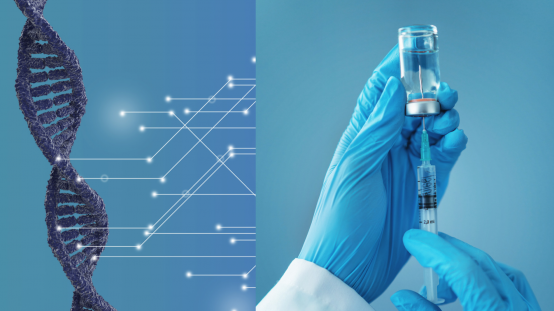
- Details
- Written by: Naomi Harrison
- Category: News
- Hits: 195
A ground-breaking trial using pharmacogenomics to improve patient recovery following surgery is now underway at Peter Mac in collaboration with the University of Adelaide, Monash University, and the University of Melbourne.
The research – which studies how a person's genes affect their response to medications - is the first study of its kind in Australia within the field of anaesthetics and it has the potential to reduce common post-operative side effects.
More than one third of the 2.6 million patients undergoing surgery across Australia each year experience postoperative complications, leading to a substantial impact on patients’ lives including morbidity, increased hospital stays, delayed return to work and increased costs to hospitals.
Some of the most common side-effects include nausea and vomiting, pain and fatigue - all of which can lead to increased time in recovery and the need for further medical intervention.
Peter Mac’s Director of Anaesthesia, Perioperative Medicine, and Pain Medicine, Professor Bernhard Riedel, said this innovative research has the potential for wide-ranging application in clinical medicine, especially around the time of surgery where between 10-20 medicines are administered to patients.
“Whilst this research has been done clinically for chemotherapy and psychiatry medications, it has not been done in the field of anaesthetics,” he said.
“The project will determine if it is possible to conduct pharmacogenomics testing prior to surgery. This information will then be used to tailor anaesthetic drugs based on the test results to improve safety, recovery and comfort after surgery.”
The trial is analysing how genes affect a person’s response to anaesthetics and pain management, with the aim to personalise anaesthetic medications to ensure the best outcome and reduce the risk of adverse effects while improving comfort.
The project, led by Prof Riedel and Dr Michelle Gerstman, specialist anaesthetist at Peter Mac and Alfred Hospital and PhD candidate, and Professors Andrew Somogyi (University of Adelaide), Carl Kirkpatrick (Monash University), and Colin Royse (University of Melbourne), has received grant support from the Federal Government’s Medical Research Future Fund (MRFF) and research foundations (Peter MacCallum Cancer Foundation, the Australia and New Zealand College of Anaesthetists, and the Australian Society of Anaesthetists). The trial is expected to run for two years.
This research will also contribute to the scientific evidence which can enable the personalisation of additional medications, such as propofol, fentanyl and oxycodone, which currently lack evidence for guidelines.
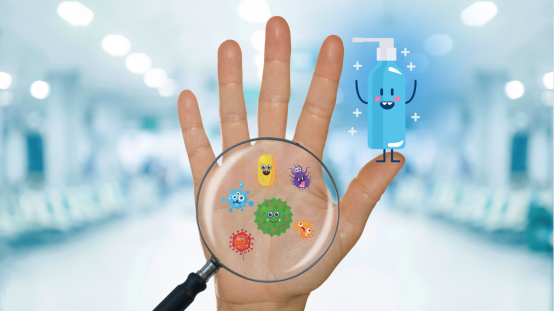
- Details
- Written by: Naomi Harrison
- Category: News
- Hits: 108
Has your hand hygiene slipped a little since the peak of the COVID-19 pandemic? If you answered yes, you’re probably not alone.
Today is International Hand Hygiene Day – a great day for us to re-invigorate the great practices we all developed over the past few years.
Did you know that human hands are one of the main ways infections are spread.
From the pole on a train, to a pedestrian crossing button and then into a hospital – infections like COVID-19, influenza and staphylococcus are constantly on the move.
When we touch our eyes, nose, or mouth with contaminated hands, we can unknowingly introduce viruses and bacteria into our bodies.
Hand hygiene is essential because it helps to break the chain of infection.
Peter Mac’s Infection Prevention Manager Elizabeth Gillespie said cancer patients and their families need to be extra vigilant with hand hygiene.
“Hand hygiene is essential for everyone, but it is particularly important for cancer patients and their families and carers,” Gillespie says.
“Cancer patients may have weakened immune systems, which makes them more susceptible to infections which could lead to complications, delay or interrupt cancer treatment, or even be life-threatening.”
Handwashing with a mild soap and warm water is the most effective method of hand hygiene, as it physically removes dirt and germs from the hands. It should be done for at least 20 seconds, ensuring that all parts of the hand, including the nails, fingertips and the backs of hands are thoroughly cleaned.
“Alcohol-based hand sanitizers are also effective in reducing the number of germs on the hands, and are used as a substitute for handwashing, when hands are not visibly soiled”, Gillespie explains.
“When using the sanitizer hand hygiene method, make sure you get in between fingers too.”
Cancer patients need to be mindful of their surroundings and take precautions when visiting public places, such as hospitals, clinics, and public transportation. Try to avoid crowded areas as much as possible, wear a mask to protect against respiratory infections, and avoid touching surfaces.
Hand hygiene is simple and incredibly effective – 20 seconds is all it takes.
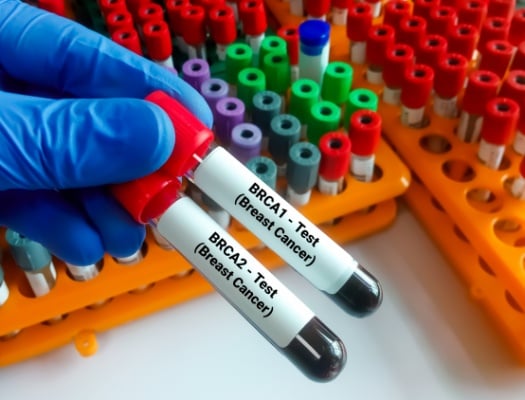
- Details
- Written by: Naomi Harrison
- Category: News
- Hits: 271
A study of women just diagnosed with breast cancer has found many have identifiable and well understood gene abnormalities, and yet they are excluded from subsidised genetic testing that can guide their treatment.
According to Australian guidelines, women with newly diagnosed breast cancer should be offered genetic testing when they meet certain strict criteria - such as being diagnosed at a very young age or if many family members have had breast cancer - amounting to a 10% or more risk of having a rare, hereditary gene mutation.
The Melbourne-based study provided genetic testing to 474 women with newly diagnosed breast cancers irrespective of their risk of having a gene abnormality, such as BRCA1 or BRCA2 mutation.
Cancer-causing gene mutations were identified in 31 of the women and more than half (18) of these patients would not have been eligible for genetic testing under the current guidelines.
The study is a collaboration between the Parkville Breast Service (Peter MacCallum Cancer Centre, Royal Melbourne Hospital and Royal Women’s Hospital), the Parkville Familial Cancer Centre and WEHI (Walter and Eliza Hall Institute), and results are published this week in the Medical Journal of Australia.
Peter Mac’s Professor Ian Campbell said the study showed that current Medicare-funded testing guidelines mean many patients miss out on vital information that could change the course of their treatment.
“Our study expanded this genetic testing to all women with newly diagnosed breast cancer and found 58% of patients identified as having a faulty gene had a risk factor of less than 10%, meaning these patients would not have been picked up under current screening guidelines,” said Prof Campbell, who is head of the Cancer Genetics Laboratory at Peter Mac.
“This demonstrates that more than half of breast cancer patients are missing out on their treatment being properly managed based on additional genetic information currently unavailable to them and their treating team.”
“The adoption of universal genetic testing for women with newly diagnosed breast cancer has the potential to improve outcomes by identifying hereditary mutations in patients and their families, leading to better treatment options and outcomes,” he said.
Approximately 5% of breast cancers occur in people who have inherited a gene abnormality from a parent.
WEHI’s Professor Geoff Lindeman said identifying these cases was vital to providing the best medical advice and intervention to patients and their wider families, and it often impacted surgery decisions.
“For example, a patient with a BRCA1 or BRCA2 gene mutation may choose to have a double mastectomy, rather than radiation therapy,” said Prof Lindeman, who is also a medical oncologist at Peter Mac and the Royal Melbourne Hospital.
“Similarly, a patient with a high risk of developing ovarian cancer might elect to have their ovaries removed as a preventative measure.”
“When a faulty gene is found, it also means family members can be tested and referred to a familial cancer clinic to manage their risk factor for developing breast or ovarian cancer.”
Professor Bruce Mann, Head of the Parkville Breast Service, said for most women in the study identified as having a gene abnormality, their recommended treatment changed as a result.
“With this additional information, the multidisciplinary team modified treatment recommendations for 77% of the women with hereditary mutations, including those not currently eligible for Medicare-funded testing,” Prof Mann said.
“We were able to incorporate this genetic testing into our existing multidisciplinary model of care, expediting treatment for patients.”
“Having their doctors initiate genetic counselling and testing streamlined the process and improved access to testing.”
Associate Professor Lesley Stafford, a clinical psychologist at the Royal Melbourne Hospital and the Parkville Familial Cancer Centre, said the research also found strong acceptance of genetic testing.
“Of the women who participated in our study, 87% agreed or strongly agreed that all women with breast cancer should be offered genetic testing,” she said.
“There was no decision regret among the participants in our study about having the genetic testing.”
The research was supported by funding from the National Breast Cancer Foundation and the National Health and Medical Research Council.
The study is titled ‘Universal genetic testing for women with newly diagnosed breast cancer in the context of multidisciplinary team care’.
DOI: https://doi.org/10.5694/mja2.51906
Contacts:
For more information:
• Contact Peter Mac Communications on 0417 123 048 or email
• Contact WEHI communications on 0475 751 811 or email
• Contact RMH Communications on 0431 481 588 or email
About Peter Mac
Peter MacCallum Cancer Centre is a world-leading cancer research, education and treatment centre and Australia’s only public health service solely dedicated to caring for people affected by cancer.

- Details
- Written by: Naomi Harrison
- Category: News
- Hits: 109
Peter MacCallum Cancer Centre welcomes Federal Government initiatives to restrict illegal vaping and discourage smoking.
Smoking is the biggest preventable cause of cancer, accounting for about 90 per cent of lung cancer cases in males and 65 per cent in females.
In 2021-22, lung cancer patients were admitted to Peter Mac more than 2800 times. More than 6500 lung cancer patients were treated at Peter Mac over the past five years.
Peter Mac Chief Executive Professor Shelley Dolan welcomed the $737 million that is to be invested in the 2023-24 Federal Budget, with a focus on protecting Australians from tobacco and vaping.
“Our mission at Peter Mac is to provide research-led expert cancer care – and we all know that prevention is incredibly important” Professor Dolan said.
“At Peter Mac, we stand with the Australian Government, prevention and advocacy bodies and health service colleagues to prevent cancers caused by tobacco and vaping.”
Professor Dolan said the $63 million commitment for a public health campaign to discourage smoking and vaping, and the $30 million committed towards cessation programs were much needed.
Lung cancer is the leading cause of cancer-related deaths worldwide, with tobacco use remaining the single greatest preventable cause of death and disease in Australia.
Peter Mac and Royal Melbourne Hospital Respiratory Physician, Associate Professor Lou Irving, said the funding announcement was very exciting for the lung cancer community in Australia.
“These new measures will help prevent people from taking up what can become a deadly habit,” Associate Professor Irving said.
“Screening is particularly important because we know it can detect lung cancer at a time when it can be successfully treated.
“This increased screening alongside additional education about smoking cessation will save lives, including among high-risk groups across Australia both in metropolitan and rural areas,” he said.
Peter Mac currently employs two Specialist Nurse Consultants who provide specialist smoking cessation advice and support.
Associate Professor Irving said the community can be confident that there is extraordinary expertise in lung cancer at Peter Mac from diagnosis to the latest treatment and clinical trials.
Contacts:
For more information:
- Contact Peter Mac Communications on 0417 123 048 or email
This email address is being protected from spambots. You need JavaScript enabled to view it.
About Peter Mac
Peter MacCallum Cancer Centre is a world-leading cancer research, education and treatment centre and Australia’s only public health service solely dedicated to caring for people affected by cancer.
